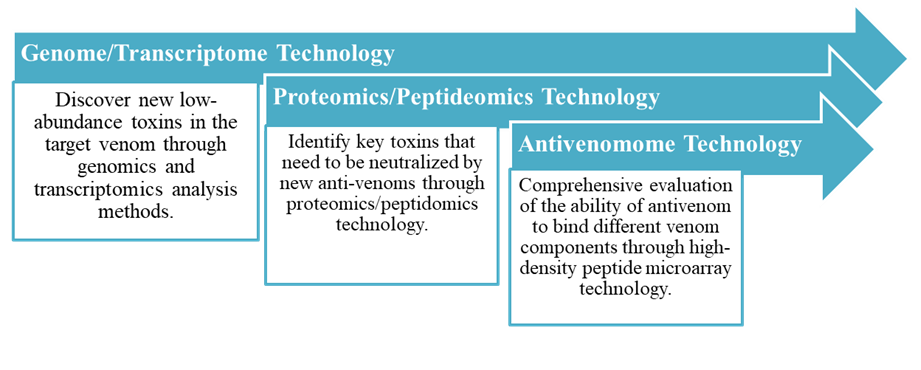Antivenom Development
Certain animal venoms, such as snakes, spiders, and scorpions, may cause pain, paralysis, and other symptoms, which may be fatal. Antivenom therapy can effectively treat venom poisoning caused by toxic animals. Creative Proteomics provides customers with services to help develop anti-venom through bioinformatics and omics tools.
Introduction
Poisonous animals pose a threat to human health. Their animal toxins can have countless different pathophysiological effects on victims, including neurotoxicity, blood toxicity, muscle toxicity, and cytotoxicity. Therefore, after these animals cause us bites or bites, we need to be treated with antivenom. Antivenom serum from immunized animals is currently the only specific treatment method for most animal venoms. Generally, monoclonal antibodies and small molecule inhibitors are chosen to neutralize the destructive effects of animal toxins.
However, the complexity of animal venom has led to the lack of antivenom development. Antivenom does not target all venom components and may cause some adverse reactions. In order to overcome these limitations of antivenom therapy, there is an urgent need to develop new methods to exert its antivenom function and reduce adverse reactions.
Our Services
Creative Proteomics provides venomomics studies to help understand the distribution and toxicity of key toxin families. These data can be used to develop new antivenoms that target the common characteristics and functions of toxins.
- We provide venom toxin proteomic/peptide analysis services. By combining proteomics with genomic/transcriptome data, we will obtain a comprehensive venom map, which can be used to identify key toxins neutralized by the antivenom and develop recombinant or synthetic antivenoms.
- We provide services for evaluating antivenom and antitoxin using omics technology. Use immobilized antivenom to perform affinity chromatography on the whole venom, and then analyze the bound and unbound venom components by RP-HPLC to comprehensively evaluate the ability of the antivenom to bind different venom components.
Technical Route
We help your antivenom development work through the guidance of different omics techniques. Discover new animal toxins based on genomics and transcriptomics, identify key neutralized toxins by venom proteomics analysis, and gain insight into the specificity and cross-reactivity of antivenom and antibodies by peptide microarray technology. The specific technical description is as follows:

Solved Problem
- Solve the problem of lack of specificity of antivenom --- new antivenoms for toxins with common characteristics and functions.
- Solve the problem of adverse reactions to animal protein involved in the production of antivenom --- search for alternative therapies, such as peptide inhibitors and small molecule inhibitors.
- Solve the problem of the ineffectiveness of antivenom's local damage --- evaluate the complete inhibitory effect of the combination of antivenom and different toxin inhibitors.
We have a professional operation team with rich experimental experience, which can provide solutions for complex venom toxins, conduct experiments efficiently, and provide a complete anti-venom development and test plan.
Creative Proteomics is committed to providing comprehensive venom development and application services. If you are interested in our services, please feel free to contact us to discuss how we can participate in your venom research plan.
Reference
- Laustsen and Andreas H. Guiding recombinant antivenom development by omics technologies. New Biotechnology, 2017.
For research use only. Not intended for any clinical use.

